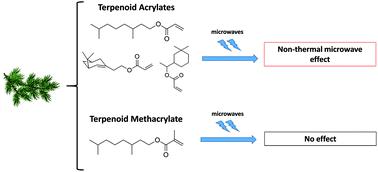当前位置:
X-MOL 学术
›
Polym. Chem.
›
论文详情
Our official English website, www.x-mol.net, welcomes your
feedback! (Note: you will need to create a separate account there.)
Non-thermal microwave effects in radical polymerization of bio-based terpenoid (meth)acrylates
Polymer Chemistry ( IF 4.1 ) Pub Date : 2020-10-13 , DOI: 10.1039/d0py01192d Thibault Castagnet 1, 2, 3, 4, 5 , Amaia Agirre 6, 7, 8, 9, 10 , Nicholas Ballard 6, 7, 8, 9, 10 , Laurent Billon 1, 2, 3, 4, 5 , José M. Asua 6, 7, 8, 9, 10
Polymer Chemistry ( IF 4.1 ) Pub Date : 2020-10-13 , DOI: 10.1039/d0py01192d Thibault Castagnet 1, 2, 3, 4, 5 , Amaia Agirre 6, 7, 8, 9, 10 , Nicholas Ballard 6, 7, 8, 9, 10 , Laurent Billon 1, 2, 3, 4, 5 , José M. Asua 6, 7, 8, 9, 10
Affiliation

|
Microwave-assisted polymerization represents an opportunity to develop efficient polymerization strategies for the synthesis of (bio)macromolecules with improved properties. The possibilities will increase tremendously if non-thermal microwave effects, i.e. effect of microwaves on the kinetic constants, are operative, because we can increase at the same time conversion and molecular weight. This work investigates these effects in the free radical polymerization of bio-based terpenoid (meth)acrylates finding that terpenoid acrylates present a strong non-thermal microwave effect, whereas the methacrylate ones do not show any effect. The reasons for these findings are discussed and the results compared with the apparently conflicting literature.
中文翻译:

生物基萜烯(甲基)丙烯酸酯自由基聚合中的非热微波效应
微波辅助聚合为开发具有改进性能的(生物)大分子合成提供有效的聚合策略提供了机会。如果非热微波效应(即微波对动力学常数的效应)起作用,则可能性将大大增加,因为我们可以同时增加转化率和分子量。这项工作研究了生物基萜烯(甲基)丙烯酸酯的自由基聚合中的这些作用,发现萜烯丙烯酸酯具有很强的非热微波作用,而甲基丙烯酸酯则没有任何作用。对这些发现的原因进行了讨论,并将结果与明显矛盾的文献进行了比较。
更新日期:2020-11-03
中文翻译:

生物基萜烯(甲基)丙烯酸酯自由基聚合中的非热微波效应
微波辅助聚合为开发具有改进性能的(生物)大分子合成提供有效的聚合策略提供了机会。如果非热微波效应(即微波对动力学常数的效应)起作用,则可能性将大大增加,因为我们可以同时增加转化率和分子量。这项工作研究了生物基萜烯(甲基)丙烯酸酯的自由基聚合中的这些作用,发现萜烯丙烯酸酯具有很强的非热微波作用,而甲基丙烯酸酯则没有任何作用。对这些发现的原因进行了讨论,并将结果与明显矛盾的文献进行了比较。











































 京公网安备 11010802027423号
京公网安备 11010802027423号